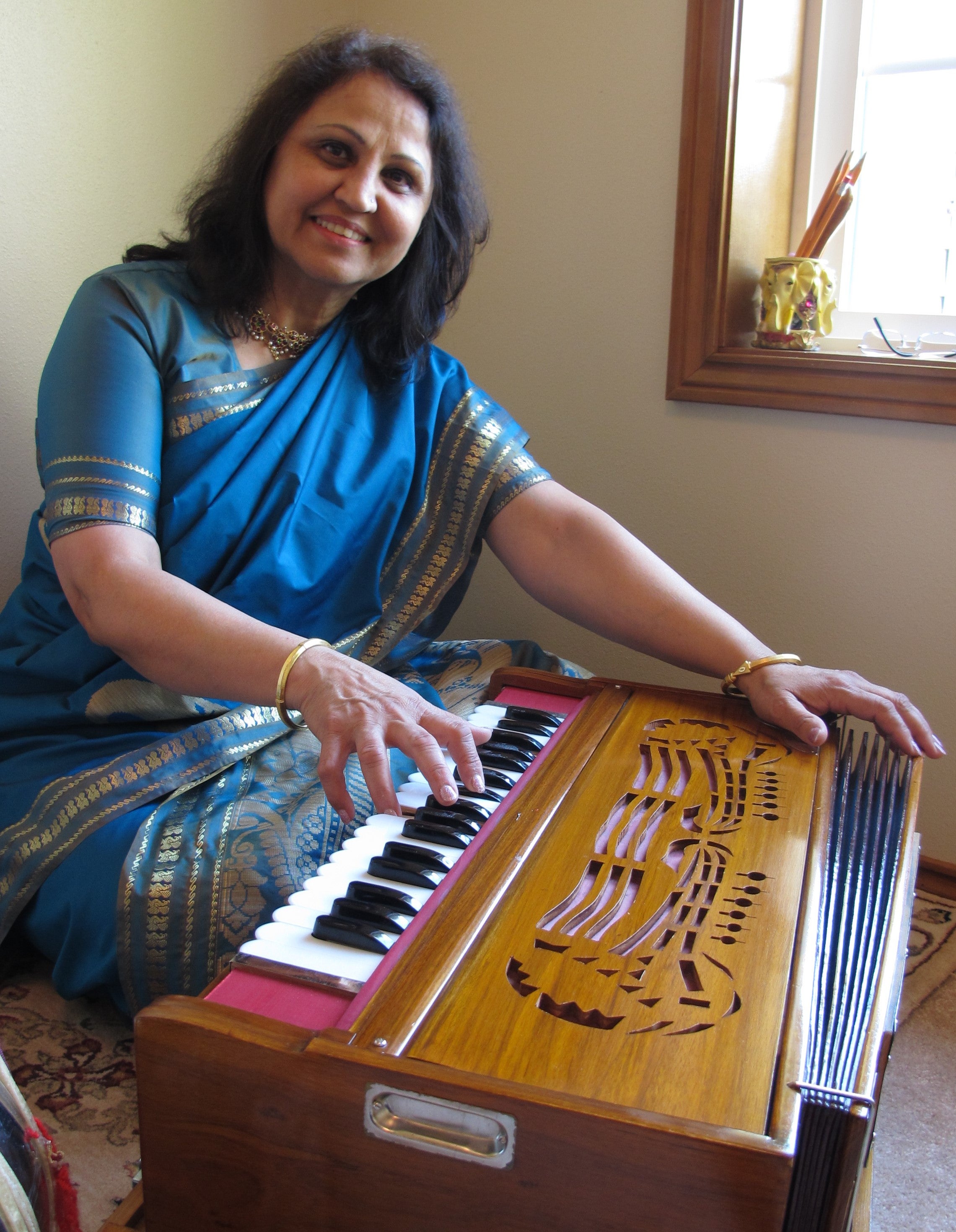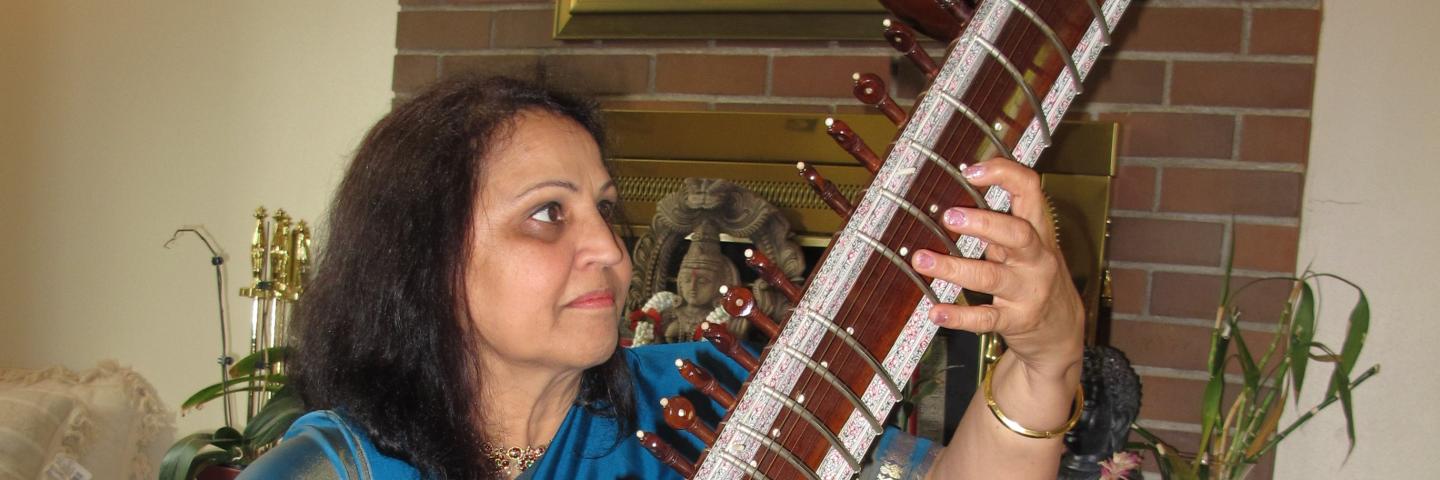 | Traditional Skill/Art: Hindustani Vocal and Instrumental Music Years Awarded: 2012, 2021 Contact Information: Phone: (503)629-0277 Email: swaranjali@gmail.com |
ARTIST BIOGRAPHY
Dr. Nisha Joshi is a Hindustani vocal and instrumental music performer and the director and teacher of Swaranjali Academy of Indian Music in Portland, Oregon. Dr. Joshi was born and raised in Rajasthan where she grew up studying North Indian classical (Hindustani) music and learning folk songs and dances of Rajasthan. She received classical music training from Ustad Basheer Ahmed Khan of Sikar Gharana and Pandit Amar Nath Ji, the disciple of Ustad Amir Khan Saheb, of Indore Gharana. Dr. Joshi also trained in sitar under Professor Pandit Balwant Rai Verma, a disciple of the renowned Pandit Ravi Shankar Ji. She also studied light music with Shri Santosh Kumar.
Dr. Joshi earned her Ph.D. in Hindustani vocals from Delhi University. Later, she taught in Kalindi College, Delhi University. She also performed both classical and folk music of Rajasthan regularly on All India Radio and Doordarshan national broadcasting stations before moving to the United States. Dr. Joshi has taught elementary through college-level classes in India and the US for more than 40 years.
Dr. Joshi has been shaping and enriching the lives of young adults in the community. Every year, Swaranjali Academy of Indian Music, affiliated with a university in India, conducts music examinations. The students devote ten to twelve years learning their art form and successfully complete Visharad (equivalent to undergraduate degree in music) by the time they graduate from high school.
Dr. Joshi has given many lecture demonstrations in various universities and colleges. To name a few: University of Oregon, University of Portland, Marylhurst University, Lewis & Clark College, Reed College, Portland Community College, Linfield College. She has also taught theory classes organized by Kalakendra the Society of Performing Arts of India.
In addition to teaching, Dr. Joshi has been performing in the Pacific Northwest for over 30 years. She has performed classical vocals, sitar, and folk repertoire at numerous community events, festivals, and concerts including events sponsored by the Regional Arts & Cultural Council, Oregon Historical Society, Asian Pacific American Performing Art Festival, and Art in the Pearl World Music Stage, to name a few.
Dr. Joshi was also a Traditional Arts Apprenticeship Program (TAAP) Awardee in 2012-2013 with apprentice Shivani Joshi. In 2022, Dr. Joshi is working with Shivani Joshi again.
APPRENTICE BIOGRAPHY - Shivani Joshi 2012/2021
Shivani Joshi is an American-born Indian musician who comes from a family of musicians. She has learned and performed Hindustani music from a young age and became deeply familiar with the practical and theoretical aspects of the tradition. Shivani has studied classical Indian music and dance for 5 years in India and hold two master’s degrees in Hindustani vocal music and Kathak classical dance. By completing her training with Nisha Joshi, Shivani wishes to deepen her knowledge of her tradition and become a master herself.
Q+A WITH THE MENTOR ARTIST
Describe your traditional art.
Body
India has a rich tradition of music and culture. There are two prevailing classical music systems of India: Hindustani classical music of the north and Carnatic classical music of the south. In ancient times, there was only a single Indian classical music system. However, in the thirteenth century, the Persians, Mughals, and Turks invaded the northern part of India, bringing their music and culture along with them. The influence of Persian music was so strong in the northern regions that a distinction between the two music traditions became apparent. This process gave birth to Hindustani music.
The Hindustani music tradition in India has endured for thousands of years. More recently, it has been brought to the United States by immigrant artists committed to protecting the tradition and passing it down to future generations in America. Since ancient times, Hindustani music has been taught via the Guru-Shishya Parampara, or “teacher-student tradition.” It remains the preferred method of music pedagogy in India to this day and is the method I plan to employ in this grant project. In the Guru-Shishya Parampara, music is not merely a subject that is learned in the school; it must become a part of everyday life.
Ragas (modes) are an important part of Indian culture since they stimulate various emotions associated with times of the day or seasons. This form of music creates a sort of harmony between emotions we feel deep within and those we outwardly express. For example, ragas are associated with certain times of day and evoke a certain mood in those performing or listening to it. It is believed that a raga is most effective when sung at the assigned time.. Morning ragas Bhairav and Todi are considered devotional, thus evoking that mood. In the Indian tradition, ragas and other daily rituals of music become an essential part of a musician's life. Throughout the day, music remains ever-present, providing relaxation, spiritual enlightenment, and peace amidst the stresses of everyday life.
How did you come to learn this tradition?
Body
I wish to pass down my knowledge of Hindustani music to my apprentice, Shivani Joshi, through the Guru-Shishya Parampara. My own experiences in this tradition began in Rajasthan, India, where I was born into a musical family and brought up learning Hindustani music from many influences. My father was passionate about music and encouraged his children to learn and master the art form. As a toddler, from dusk ‘till dawn, I listened to my sisters practice; this immersion trained my musical ear. I began my formal music training when I was six years old. My guru, Ustad Basheer Ahmad Khan from Sikar Gharana (school) would teach me for a couple hours each and every day. This one-on-one training lasted until I completed my undergraduate degree. Later, I moved to Delhi where I completed a Ph.D. in music from the Delhi University. By then, music had become not only my passion, but a core part of my identity.
The oral tradition of Guru-Shishya Parampara was central to my musical training. No written material was given to me by my gurus; they expected me to memorize compositions before the next lesson. My parents, who were supportive of my career choice, spent countless hours helping me. My father, who himself was musically inclined, would accompany me on the table or harmonium. He would also organize home recitals to build our performance capabilities. With his keen music knowledge, he would critique our performances and give us feedback for improvement. He also encouraged me to practice mindfully. Music is often a lonely subject. One must truly be motivated to practice regularly. Mentors play a vital role by increasing the duration of practice. Because of my parents’ dedication and encouragement, I could pursue a life in music. Additionally, my father’s interest in various music genres and instruments encouraged me to learn and practice different forms of compositions, such as khayal, tarana, chaturang, thumri,bhajan, ghazal, bhajan, folk songs, and various instruments like harmonium, sitar, and tabla. The knowledge of different genres deepened my understanding of ragas music.
The traditions of Indian music have been deeply meaningful in my life and those around me. Music has a primary place in Indian culture and is an essential part of life. For example, when a woman is seven months pregnant, during the Godbharai or baby shower, childrens’ songs are sung to celebrate and welcome the new life. Similarly, there are songs for every other milestone. Even when life is nearing the end, the Bhagvad Geeta, or holy book, is recited to the departing soul. When that person is taken for cremation, music is chanted for their peaceful passing. Thus, music plays a vital part in all stages of life.
Why is this cultural tradition important to your community?
Body
I have been teaching music for the last 48 years, and for over 30 years in the greater Portland area. I am very passionate about teaching music. For me it is more than just a profession, it is a way of life. My goal is to contribute to society by providing my students with an in-depth knowledge of the subject and to appreciate the inner meaning of music. The practice of Indian music helps a person develop spiritually, and study of Indian music theory teaches the rich culture and heritage of India.
Having spent the first thirty years of my life in India, I find it very important to blend the stories and history into the teaching of music to expose students to the cultural aspects of the tradition. I see my students as unique individuals who have different learning capabilities. For them to succeed, I must develop various strategies tailored to improve their unique talents. My school Swaranjali Academy of Indian Music is affiliated with a music university, Pracheen Kala Kendra, Chandighad, Punjab, India. After many years of training, my students take music examinations, completing Sangeet Visharad, equivalent to an undergraduate degree in Indian music, by the time they graduate from high school. With this base music knowledge, my students are involved in both Indian and Western music activities in school and college, such as choir or acappella.
Experience/Honors
Body
She has been awarded an Individual Artist’s Grant from RACC, two Traditional Arts Apprenticeships from the Oregon Historical Society and the Oregon Folklife Network. She was one of eight artists selected to participate in Jack Straw Production’s Traditional Artist Support Program that was supported by the National Endowment for Arts, the Lila Wallace Reader’s Digest Community Folk Arts Program, and Washington State’s King county Arts commissions. She has also performed in front of Archbishop Desmond Tutu at the The World Affairs Council's International Speakers Series in Portland in front of 5000 people.
Dr. Joshi has been involved with non-profit organizations including India Cultural Organization and is on the board of Kalakendra Society of Performing Arts of India since the early 1990s.
Visit OFN's Culture Keepers Roster to learn more about the artist.
Traditional Arts Apprenticeship Program
More OFN programs
OFN main page
